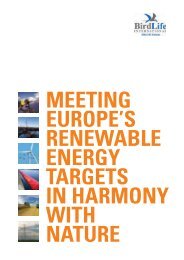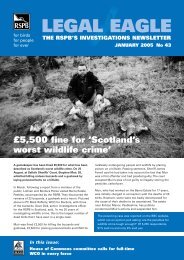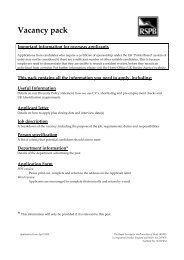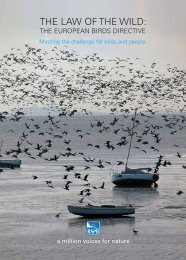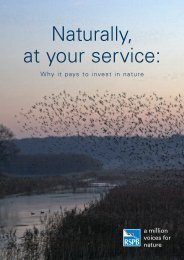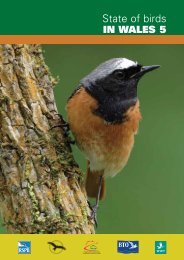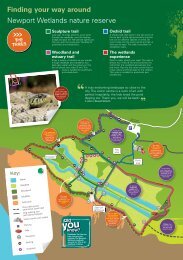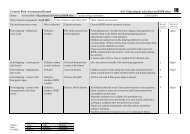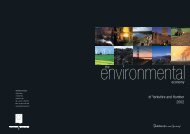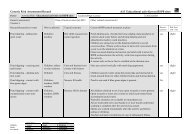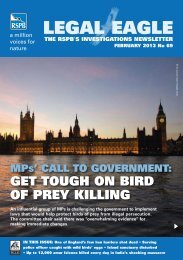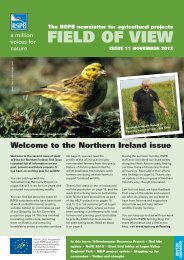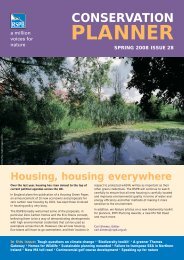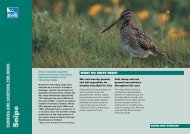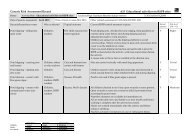annual report and accounts 2012 - RSPB
annual report and accounts 2012 - RSPB
annual report and accounts 2012 - RSPB
You also want an ePaper? Increase the reach of your titles
YUMPU automatically turns print PDFs into web optimized ePapers that Google loves.
<strong>RSPB</strong> trustees’ <strong>report</strong> <strong>and</strong> <strong>accounts</strong> 2011-12<br />
Financial <strong>report</strong> on the year<br />
Outcome for the year<br />
The year ended with an increase in available<br />
cash <strong>and</strong> investments of £2.6 million. With<br />
economic difficulties affecting many people in<br />
many countries the prospect of a worse outcome<br />
was very real. We are thankful that the majority<br />
of our income streams held up well, so our<br />
conservation work programmes could continue<br />
uninterrupted. The Trustees are committed to<br />
putting income to work as soon as possible; the<br />
surplus has been earmarked for projects which<br />
cross over the year-end.<br />
Income<br />
The continued backing we receive from our<br />
members <strong>and</strong> supporters means that the<br />
underlying income trend was stable in spite of<br />
challenging times. We value highly, the current<br />
support of more than a million people through<br />
membership, donations, buying from our shops<br />
<strong>and</strong> catalogue <strong>and</strong> of course from legacies. These<br />
are the bedrock of all we do <strong>and</strong> we are hugely<br />
grateful that people continue to join <strong>and</strong> support<br />
us even in difficult times. However, we are not<br />
immune to the impact of external pressures on our<br />
income.<br />
Membership subscriptions <strong>and</strong> donations include<br />
tax recovery under the Gift Aid scheme, which fell<br />
by around £0.7 million due to the end of the<br />
“transition relief” - introduced by the Government<br />
to cushion the impact of reducing the basic rate of<br />
income tax from 22% to 20% in 2008.<br />
The grant income trend is slightly deceptive where<br />
the timing of receipt of the income is crucial. It<br />
would have been flat over the two years if we had<br />
received the £1.2 million that was earmarked by<br />
the donor for the restoration of Bowers Marsh in<br />
Essex a couple of weeks later. However, a<br />
proportion of our grant income has been affected<br />
by the Government’s Comprehensive Spending<br />
Review <strong>and</strong> funding for a number of species<br />
recovery projects was affected. Fortunately, some<br />
grant agreements run over many years; this gives<br />
us time to both advocate against reductions <strong>and</strong><br />
seek alternative funding. Support in this area<br />
comes from local, national <strong>and</strong> international<br />
sources – see Acknowledgements for the full list -<br />
the breadth gives us the opportunity to plan our<br />
work with a degree of confidence.<br />
To provide even more stability <strong>and</strong> growth to our<br />
income, we are starting to gain more financial<br />
support from the corporate sector where social<br />
responsibility, despite economic difficulties, is<br />
gaining importance all the time. There is a<br />
growing recognition amongst forward-thinking<br />
Trustees’ <strong>report</strong><br />
companies that this is an important ingredient for<br />
success <strong>and</strong> we are ideally placed to benefit. In this<br />
arena, we are delighted to be working with Tesco to<br />
help protect rainforests around the world. Twenty<br />
million shoppers, including <strong>RSPB</strong> supporters, can now<br />
take another “Step For Nature” through this scheme -<br />
a huge opportunity in the battle against climate<br />
change. Partnerships like this one can take many<br />
months from inception to launch but a sound<br />
relationship can serve both parties well over many<br />
years. The deal with the Co-operative Bank has run<br />
since 1989 <strong>and</strong> has helped us to raise around £10<br />
million through the <strong>RSPB</strong> affinity credit card.<br />
Net income (money available for charitable purposes),<br />
at £89.3 million, was slightly down on the previous<br />
year. This is shown after deducting £17.9 million cost<br />
of generating income <strong>and</strong> a further £12.5 million cost<br />
of goods for resale by our trading operation. The<br />
majority of products sold, such as bird food <strong>and</strong><br />
feeders, optics, wildlife books <strong>and</strong> videos, relate<br />
directly to our charitable objectives.<br />
Cost of generating income increased due to<br />
inflationary pressure in a number of areas such as<br />
printing <strong>and</strong> postage costs. We also invested in future<br />
income growth; by bringing our processes up to date<br />
<strong>and</strong> promoting the opportunity for supporters to<br />
upgrade their <strong>annual</strong> subscription to a monthly<br />
amount of their choice.<br />
Expenditure<br />
The diversity of our income streams gave us the<br />
financial stability to continue to increase our<br />
conservation <strong>and</strong> education work, spending £1.2<br />
million more than last year. In addition, expenditure<br />
on l<strong>and</strong> purchases <strong>and</strong> associated visitor facilities<br />
increased by £1.0 million from a comparatively low<br />
base in 2011. The reduced availability of grants <strong>and</strong> the<br />
high price of l<strong>and</strong> continue to constrain our<br />
aspirations. We believe that acquiring l<strong>and</strong> is the most<br />
enduring way of safeguarding habitat; it would be a<br />
disaster for nature conservation if future generations<br />
were to witness further loss of biodiversity as a<br />
consequence of our generation’s financial woes.<br />
As well as making nature reserves <strong>and</strong> protected areas<br />
the best they can be for nature, we must work on the<br />
pieces of l<strong>and</strong> between them to join up the fragments<br />
of habitat that go to make up the l<strong>and</strong>scapes that are<br />
important to wildlife. Futurescapes is the name we<br />
give to the vision for these l<strong>and</strong>scapes <strong>and</strong> provides a<br />
brilliant example of how the <strong>RSPB</strong> has been able to<br />
progress l<strong>and</strong> management in spite of the recession.<br />
Nature reserves are an important part of l<strong>and</strong>scapescale<br />
conservation, but it is unrealistic for a single<br />
organisation to realise the vision alone. The key to<br />
success is partnership working. For example, we work<br />
with United Utilities in the Forest of Bowl<strong>and</strong> in<br />
18 www.rspb.org.uk



